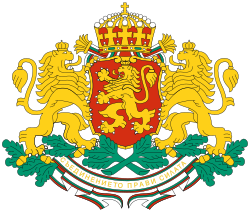Aftermath
Malinov's fifth government
The People's Bloc formed a government, with the DP taking a leading role and its leader Aleksandar Malinov becoming Prime Minister, despite BZNS-Vrabcha 1 having won a plurality of the coalition's seats. The government sought to improve conditions during the economic crisis, however the coalition was unstable with a constant power struggle between the two large parties, as well repeated fracturing in the smaller coalition partners (NLP and RP). Malinov resigned and became Chairman of Parliament in September 1931 and was succeeded as PM by Nikola Mushanov. Full freedom of speech and press and an amnesty for BZNS leaders was issued, however the authoritarian State Protection Act [ bg ] was kept in place and expanded. A protocol with Albania was signed in 1932, aimed at protecting ethnic minority populations and Bulgaria's war reparations payments were postponed later that year. The government sought to improve relations with Yugoslavia and France, in the hopes of reaching an agreement to take back Western Thrace from Greece, but these efforts came to an end after the formation of the Balkan Pact. Mushanov resigned on 15 May 1934, following another power struggle with BZNS-Vrabcha 1. During his three consecutive governments, the popularity of fascist and far-right movements grew significantly, notably the opposition NSD and groups like the Zveno, SBRZ and SBNL. [6] [7] The NSD had prepared a coup for the 22 May 1934, but, having learned of their plans, the Zveno circle and the Bulgarian Military Union [ bg ] executed a coup on the 19th of May and Kimon Georgiev was appointed as PM. [8]
Having overthrown the democratic government, the Zveno established an authoritarian regime and ruled through royal decree. Political parties were banned and the National Assembly was dissolved. Local autonomy and administration was completely overhauled, replaced by government appointed officials. The State Renewal Directorate [ bg ] was formed as a propaganda tool and strong press censorship was put in place. A state controlled trade union was formed and all other unions were banned. Many state monopolies were formed and enterprises and banks were combined under state supervision, notably the Bulgarian Creddit Bank [ bg ] and the Bulgarian Agrarian and Cooperative Bank [ bg ]. Additionally, Social security was established and the VMRO was banned. The government maintained a close relationship with Yugoslavia. There were strong republican tendencies in the Zveno and some believe their coup initially intended to also overthrow Tsar Boris III. By the autumn of 1934 a republican faction led by PM Georgiev and Damyan Velchev and a monarchist faction led by defense minister Pencho Zlatev had formed. In October Georgiev attempted to replace Zlatev with Velchev, but this was opposed by the leadership of the Bulgarian Military Union [ bg ]. Following a power struggle, Georgiev resigned in early 1935 and Zlatev succeeded him as PM. After a failed coup attempt by Velchev in 1935 [ bg ], the Military Union was dissolved and an army reform was implemented to ensure its support.
The new monarchist regime sought to centralize the authority of Boris III. In April 1935 Andrey Toshev a scientist close to the monarch, was appointed as PM. In November he was replaced by Interior minister Georgi Kyoseivanov. Bulgaria began to increasingly rely on foreign trade, particularly with Nazi Germany. Having entrenched his powers, the monarch and his non-partisan regime approved a new electoral law in 1937 and scheduled elections for 1938. [7]
This page is based on this
Wikipedia article Text is available under the
CC BY-SA 4.0 license; additional terms may apply.
Images, videos and audio are available under their respective licenses.


